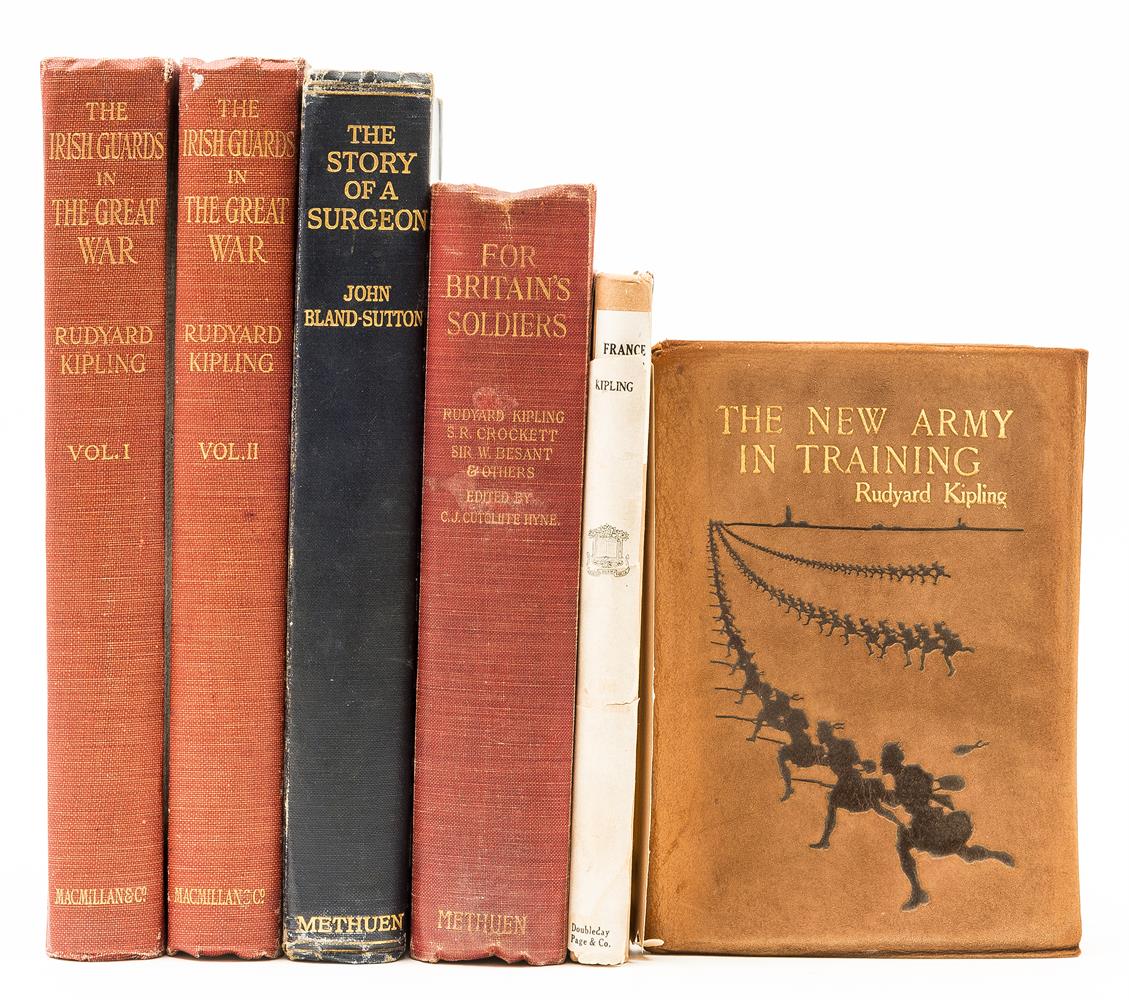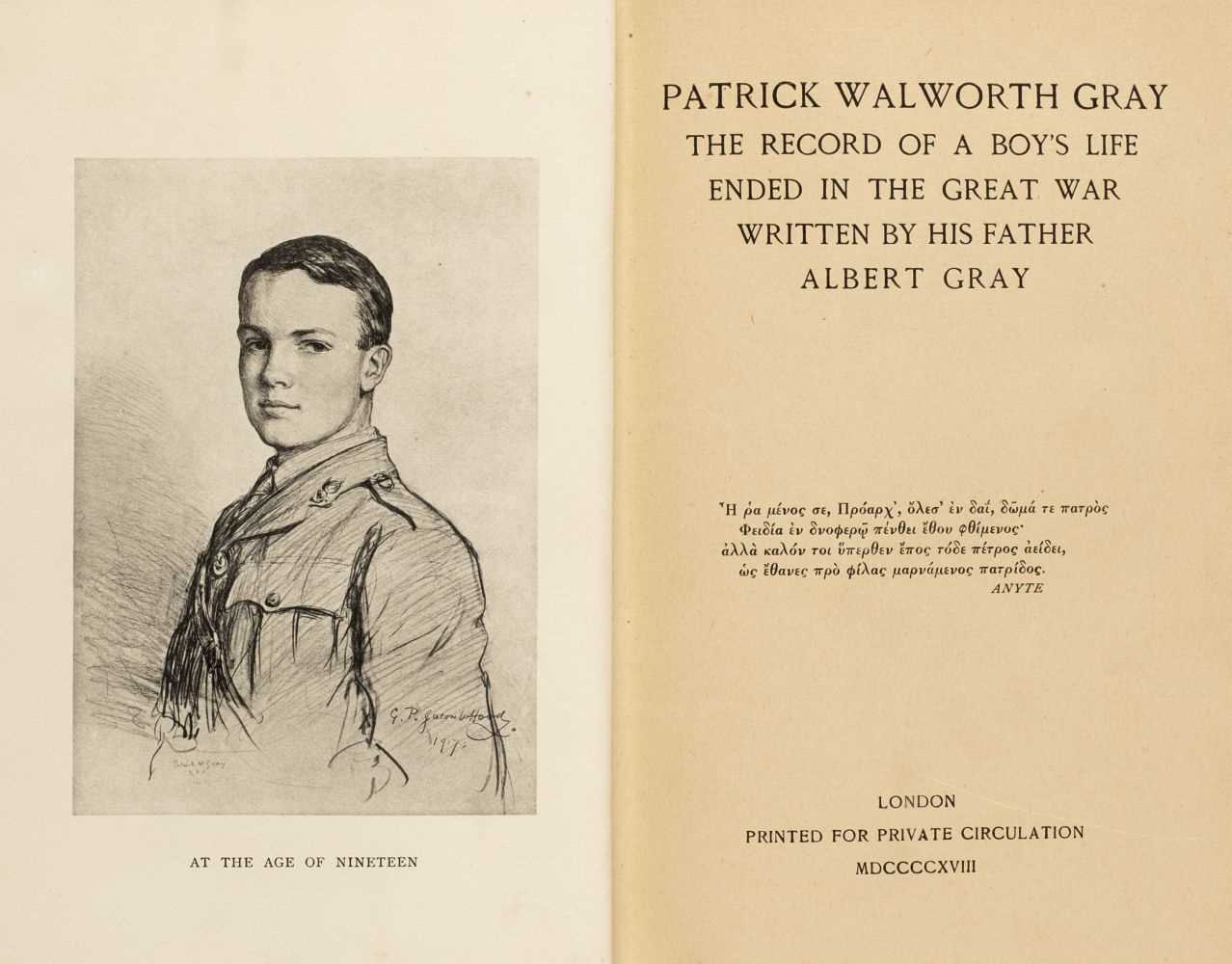An Original Great War Verdun Railway Painted Sheet Metal Sign by Sabine & Jacob of Paris, with shrapnel damage, 35cm x 120cm: William F. Peirce, American Red Cross, Second French Army, Verdun, France 1918, thence by descentthe Great War Dr. Peirce was sent to France by the Lake Division of the American Red Cross in February, 1918, and remained until June. The spring was spent in active service at Verdun with the Fourth Division of the Second French Army. Upon his return President Peirce received commendation both from the French and American Red Cross organisations for this service. "Doctor William Foster Peirce was president of Kenyon College, Ohio for forty years, during the Great War he had wished to join the armed services in Europe, but was informed he was to old. However they made him president of the American Red Cross. At this time he had a contribution for both of the signs [$10,000] each, when the war was over he gave one sign to Kenyon College, and kept one which he gave to me in 1960" Henry Varnum Poor - 'Ils Ne Passeront Pas'! 'La Porte de Verdun', print, dated 1919, signed by the artist in pencil, lower margin, mounted, framed and glazed, 37cm x 52cm. "Vous Ne Les Laisserez Pas Passer, Mes Camarades" The Battle of Verdun in 1916 was the longest single battle of the Great War. The casualties from Verdun and the impact the battle had on the French Army was a primary reason for the British starting the Battle of the Somme in July 1916, in an effort to take German pressure off of the French at Verdun. The Battle of Verdun started on February 21st 1916 and ended on December 16th in 1916, it resulted in 698,000 battlefield deaths, 362,000 French and 336,000 German combatants, an average of 70,000 deaths for each of the ten months of the battle.French appointed General Philippe Pétain in charge of the defence of Verdun. He was faced with an extremely difficult situation. There was only one road into Verdun from the outside. In fact, it was barely a road by definition. It was only twenty feet wide and vehicles could barely pass one another. Yet along this road, 25,000 tons of supplies were moved into Verdun and 90,000 soldiers. 6,000 vehicles were used in this task and it is said that 66% of the French army was to pass up this road at some time during the battle to save Verdun. The road was given the nickname "Sacred Way" by the French. But despite the new military input, the French suffered badly. "You eat beside the dead; you drink beside the dead, you relieve yourself beside the dead and you sleep beside the dead."People will read that the front line was Hell. How can people begin to know what that one word - Hell - means." An Unknown French Soldier "Hell cannot be so terrible as this. Humanity is mad; it must be mad to do what it is doing." "An artery of French blood was spilt on February 21st and it flows incessantly in large spurts."
An Original Great War Verdun Railway Painted Sheet Metal Sign by Sabine & Jacob of Paris, with shrapnel damage, 35cm x 120cm: William F. Peirce, American Red Cross, Second French Army, Verdun, France 1918, thence by descentthe Great War Dr. Peirce was sent to France by the Lake Division of the American Red Cross in February, 1918, and remained until June. The spring was spent in active service at Verdun with the Fourth Division of the Second French Army. Upon his return President Peirce received commendation both from the French and American Red Cross organisations for this service. "Doctor William Foster Peirce was president of Kenyon College, Ohio for forty years, during the Great War he had wished to join the armed services in Europe, but was informed he was to old. However they made him president of the American Red Cross. At this time he had a contribution for both of the signs [$10,000] each, when the war was over he gave one sign to Kenyon College, and kept one which he gave to me in 1960" Henry Varnum Poor - 'Ils Ne Passeront Pas'! 'La Porte de Verdun', print, dated 1919, signed by the artist in pencil, lower margin, mounted, framed and glazed, 37cm x 52cm. "Vous Ne Les Laisserez Pas Passer, Mes Camarades" The Battle of Verdun in 1916 was the longest single battle of the Great War. The casualties from Verdun and the impact the battle had on the French Army was a primary reason for the British starting the Battle of the Somme in July 1916, in an effort to take German pressure off of the French at Verdun. The Battle of Verdun started on February 21st 1916 and ended on December 16th in 1916, it resulted in 698,000 battlefield deaths, 362,000 French and 336,000 German combatants, an average of 70,000 deaths for each of the ten months of the battle.French appointed General Philippe Pétain in charge of the defence of Verdun. He was faced with an extremely difficult situation. There was only one road into Verdun from the outside. In fact, it was barely a road by definition. It was only twenty feet wide and vehicles could barely pass one another. Yet along this road, 25,000 tons of supplies were moved into Verdun and 90,000 soldiers. 6,000 vehicles were used in this task and it is said that 66% of the French army was to pass up this road at some time during the battle to save Verdun. The road was given the nickname "Sacred Way" by the French. But despite the new military input, the French suffered badly. "You eat beside the dead; you drink beside the dead, you relieve yourself beside the dead and you sleep beside the dead."People will read that the front line was Hell. How can people begin to know what that one word - Hell - means." An Unknown French Soldier "Hell cannot be so terrible as this. Humanity is mad; it must be mad to do what it is doing." "An artery of French blood was spilt on February 21st and it flows incessantly in large spurts."















Testen Sie LotSearch und seine Premium-Features 7 Tage - ohne Kosten!
Lassen Sie sich automatisch über neue Objekte in kommenden Auktionen benachrichtigen.
Suchauftrag anlegen